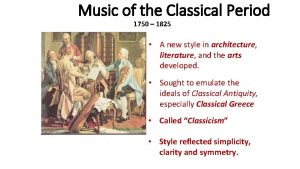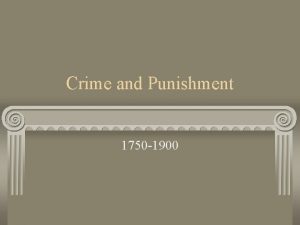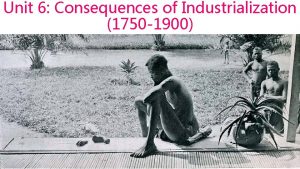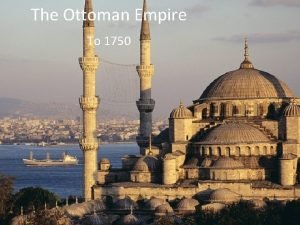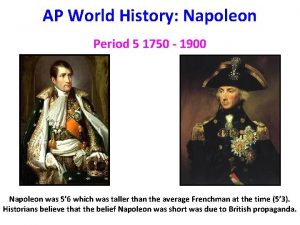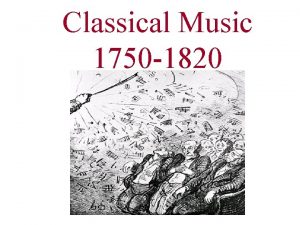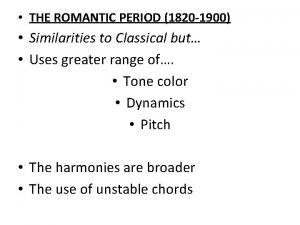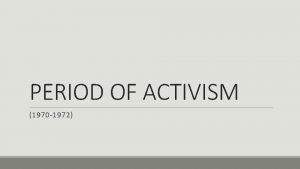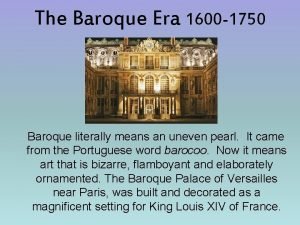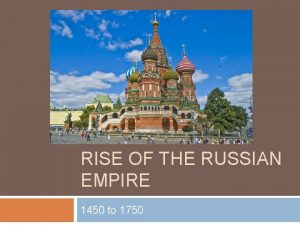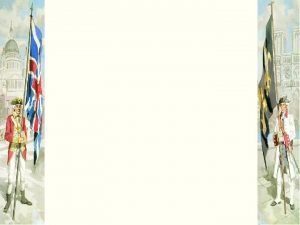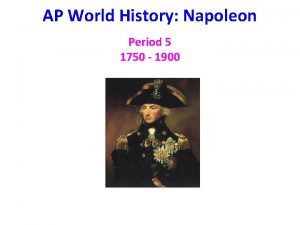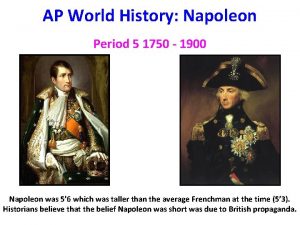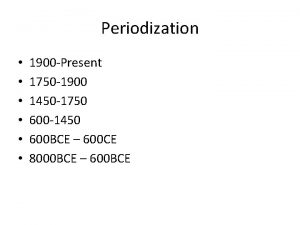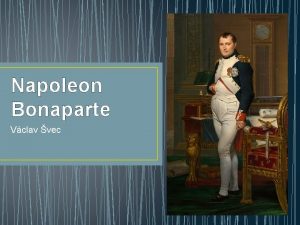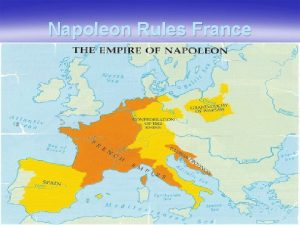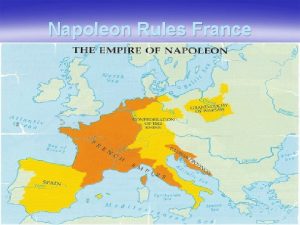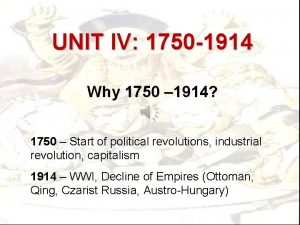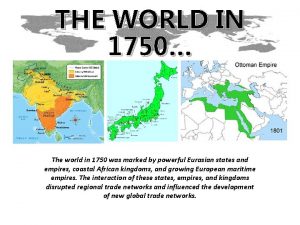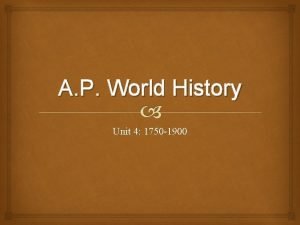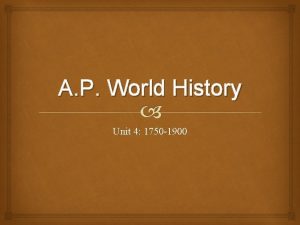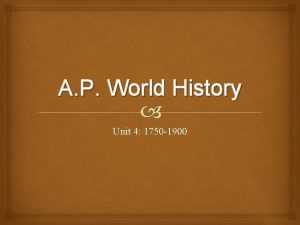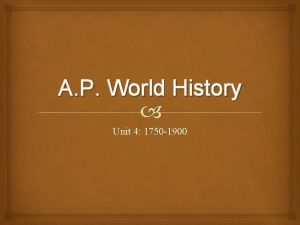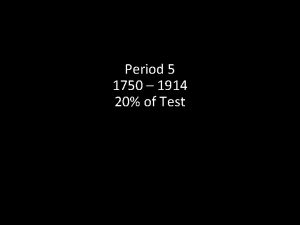AP World History Napoleon Period 5 1750 1900

































- Slides: 33

AP World History: Napoleon Period 5 1750 - 1900 Did you know? Napoleon was 5’ 6 which was taller than the average Frenchman at the time (5’ 3). Historians believe that the belief Napoleon was short was due to British propaganda.

I Napoleon’s Early Career A) Napoleon Bonaparte was born in 1769 on the Mediterranean island of Corsica. His parents were minor Corsican nobles. The year before Napoleon’s birth, France acquired Corsica from the Italian city-state of Genoa. Napoleon later adopted a French spelling of his last name. B) Napoleon attended school in mainland France, and graduated from a French military academy in 1785. The French Revolution began in 1789. During the early years of the revolution, Napoleon was largely on leave from the military and home in Corsica, where he became affiliated with the Jacobins. In 1793, following a clash with the nationalist Corsican governor, the Bonaparte family fled their native island for mainland France, where Napoleon returned to military duty. "I was born when [Corsica] was perishing. Thirty thousand Frenchmen spewed on to our shores, drowning the throne of liberty in waves of blood. . . The cries of the dying, the groans of the oppressed and tears of despair surrounded my cradle from the hour of my birth. ” – Napoleon Bonaparte

Napoleon’s Early Career Continued… C) In France, Napoleon became associated with Augustin Robespierre, the brother of revolutionary leader Maximilien Robespierre, a Jacobin who was a key force behind the Reign of Terror (1793 -1794). After Robespierre fell from power and was guillotined (along with Augustin) in July 1794, Napoleon was briefly put under house arrest for his ties to the brothers. D) In 1796, Napoleon commanded a French army that defeated the larger armies of Austria, one of his country’s primary rivals, in a series of battles in the Italian peninsula, leading to territorial gains for the French.

Napoleon’s Early Career Continued… E) The following year, the Directory, the five-person group that had governed France since 1795, offered to let Napoleon lead an invasion of England. Napoleon determined that France’s naval forces were not yet ready to go up against the superior British Royal Navy. Instead, he proposed an invasion of Egypt in an effort to wipe out British trade routes with India. Napoleon’s troops scored a victory against Egypt’s military rulers, the Mamluks, at the Battle of the Pyramids in July 1798; soon, however, his forces were stranded after his naval fleet was nearly decimated by the British at the Battle of the Nile in August 1798. In early 1799, Napoleon’s army launched an invasion of Ottoman-ruled Syria, which ended with the failed siege of Acre, located in modern-day Israel. That summer, Napoleon opted to abandon his army in Egypt and return to France.

Napoleon in Egypt “On July 1, 1798, Napoleon landed in Egypt with 400 ships and 54, 000 men and proceeded to invade the country… it was a military failure but a cultural success. For, in addition to soldiers and sailors, Napoleon brought along 150 savants — scientists, engineers and scholars whose responsibility was to capture, not Egyptian soil, but Egyptian culture and history. . . Meticulous topographical surveys were made, native animals and plants were studied. . . Most famously, ancient Egypt was discovered — the temples and tombs of Luxor, Philae, Dendera, and the Valley of the Kings. Each of these sites was measured, mapped, and drawn… in 1809, the first volumes of the Description de l'Égypte were published. Oh- and the Rosetta Stone was discovered! But… On August 1, 1798, Admiral Horatio Nelson's fleet decimated his forces in the Battle of the Nile. . . ” –lindahall. org

Napoleon’s Early Career Continued… F) In November 1799, Napoleon was part of the coup of 18 Brumaire that successfully overthrew the French Directory. G) The Directory was replaced with a three-member Consulate, and Napoleon became first consul, making him France’s leading political figure. In 1802, he made himself sole “Consul for Life. ” In 1804 he crowned himself Emperor of France. Paul Barras, one of the directors whom Napoleon overthrew, was a former lover of Josephine Bonaparte (Napoleon’s wife!).

19 Brumaire, eleven o'clock at night: When I returned to Paris, I found division in all the Authorities' ranks. They could only agree on one truth, that the Constitution was half destroyed and could not save liberty. All the parties came to me. . . I refused to be the man of one party. The Council of Ancients called me; I answered them. Men in whom the Nation is accustomed to seeing the defenders of liberty, equality and property had devised a general restoration plan… the Council of Ancients resolved to transfer the Legislative Body to Saint-Cloud; they put me in charge of the military force necessary for its independence. I believed I owed it to my fellow citizens, to the soldiers perishing in our armies, to the national glory acquired with their blood, to accept the command. The Councils met at Saint-Cloud; the republican troops guaranteed their safety outside. But assassins sowed terror inside; several Deputies of the Council of Five Hundred, armed with stilettos and firearms. . . The carefully-laid plans went awry. . . I presented myself to the Council of Five Hundred, alone, unarmed, bare-headed, as the Ancients had received and applauded me; I went there to… assure it of its power… twenty assassins rushed towards me seeking my chest: the Grenadiers of the Legislative Body, whom I had left at the door, ran over, putting themselves in between the assassins and me. One of those brave Grenadiers (Thomé) was struck by a stiletto that pierced his clothes. They took me away. At the same time, shouts of “outlaw!” were heard against the defender of “the law”…

19 Brumaire, eleven o'clock at night Continued… That was the assassins’ fierce cry against the forces that had come to repress them. They thronged around the president, threats on their lips and weapons in their hands; they ordered him to declare me outside the law; I was warned; I gave the order to tear him out of their furious clutches, and six Grenadiers of the Legislative Body took hold of him. Immediately afterwards, the Grenadiers of the Legislative Body charged into the room and evacuated it. The frightened dissidents scattered and ran away. The majority, which had been subjected to their violence, freely and peacefully went back into the meeting room, heard the proposals for restoring public safety and prepared the salutary resolution that must become the new and provisional law of the Republic. Frenchmen, in this conduct you undoubtedly recognize the zeal of a soldier of liberty and a citizen devoted to the Republic. Conservative, liberal, tutelary ideas exercised their right to disperse the dissidents oppressing the Councils, who, becoming the most loathsome of men, will always be the most despicable. Signed BONAPARTE

Europe in 1800

II The Reign of Napoleon I A) From 1803 to 1815, France was engaged in the Napoleonic Wars, a series of major conflicts with various coalitions of European nations. B) In 1803, partly as a means to raise funds for future wars, Napoleon sold France’s Louisiana Territory in North America to the newly independent United States for $15 million, a transaction that later became known as the Louisiana Purchase.

The Reign of Napoleon I Continued… C) October 1805, the British wiped out Napoleon’s fleet at the Battle of Trafalgar off the coast of Spain. However, in December 1805, Napoleon achieved one of his greatest victories at the Battle of Austerlitz, in which his army defeated the Austrians and Russians. The victory resulted in the dissolution of the Holy Roman Empire and the creation of the Confederation of the Rhine. Above: “The Plumb Pudding in Danger”

The Confederation of the Rhine Before the campaigns of Napoleon, Germany was divided into hundreds of independent states and cities. Although the people were Germanic, they had little sense of national identity. The Confederation of the Rhine was formed in 1806 when 16 minor German states allied themselves with Napoleon. The 15+ million people living within the Confederation provided a physical barrier along France's eastern borders, and also raised more troops. Key members included Bavaria, Saxony, and Westphalia. *The Confederation of the Rhine increased German nationalism.

The Reign of Napoleon I Continued… D) Beginning in 1806, Napoleon established the Continental System of blocking European ports from British trade. It failed because of Britain’s superior navy, and the blockades were not effective long term.

The Reign of Napoleon I Continued… E) Napoleon reestablished a French aristocracy (eliminated in the French Revolution) and began handing out titles of nobility to his friends and family. F) Social Reforms: 1. Napoleon established the Banque de France in 1800 2. The Concordat of 1801 reestablished the Roman Catholic Church in France. 3. Lycées (schools) were created in 1801, and divided into three types : classical studies, modern studies, and scientific-technological studies. 4. The Code Napoleon of 1803 reformed the French legal code to reflect the principles of the French Revolution, and to create one law code for France. It divided civil law into: üPersonal status. üProperty. üThe acquisition of property.

Napoleon’s Family Jerome Bonaparte King of Westphalia. Joseph Bonaparte King of Spain Louise Bonaparte King of Holland Pauline Bonaparte Princess of Italy Napoléon Francis Joseph Charles (son) King of Rome Elisa Bonaparte Grand Duchess of Tuscany Caroline Bonaparte Queen of Naples

III The Downfall of Napoleon A) In 1810, Russia withdrew from the Continental System. In retaliation, Napoleon led a massive army into Russia in the summer of 1812. Rather than engaging the French in a full-scale battle, the Russians adopted a strategy of retreating whenever Napoleon’s forces attempted to attack. As a result, Napoleon’s troops trekked deeper into Russia despite being ill-prepared for an extended campaign. Napoleon’s forces marched on to Moscow, only to discover it was evacuated. Retreating Russians set fires across the city. After waiting a month for a surrender that never came, Napoleon, faced with the onset of the Russian winter, was forced to order his starving, exhausted army out of Moscow. Of Napoleon’s 600, 000 troops who began the campaign, only an estimated 100, 000 made it out of Russia.

Napoleon Gets His Butt Kicked In Russia!

The Downfall of Napoleon Continued… B) At the same time as the Russian invasion, French forces were engaged in the Peninsular War (1808 -1814), which resulted in the Spanish and Portuguese, with British help, driving the French from Iberia. In 1813 Napoleon was again defeated at the Battle of Leipzig (or the “Battle of Nations”), by a coalition of Austrian, Prussian, Russian and Swedish troops. Napoleon retreated to France, and in March 1814 coalition forces captured Paris. C) On April 6, 1814, Napoleon, then in his mid-40 s, was forced to abdicate throne. With the Treaty of Fontainebleau, he was exiled to Elba, a Mediterranean island off the coast of Italy. He was given sovereignty over the small island, while his wife and son went to Austria.

Napoleon in Exile on Elba

The Downfall of Napoleon Continued… D) On February 26, 1815, after less than a year in exile, Napoleon escaped Elba and sailed to the French mainland with a group of more than 1, 000 supporters. On March 20, he returned to Paris, where he was welcomed by cheering crowds. The new king, Louis XVIII (17551824), fled, and Napoleon began what came to be known as his Hundred Days campaign. E) Upon Napoleon’s return to France, a coalition of allies–the Austrians, British, Prussians and Russians–who considered the French emperor an enemy, began to prepare for war. Napoleon raised a new army. In June 1815, his forces invaded Belgium, where British and Prussian troops were stationed. On June 18, at the Battle of Waterloo near Brussels, the French were crushed by the British, with assistance from the Prussians. On June 22, 1815, Napoleon was once again forced to abdicate.

The Downfall of Napoleon Continued… In October 1815, Napoleon was exiled to the British island of Saint Helena, in the South Atlantic Ocean. He died there on May 5, 1821, at age 51, most likely from stomach cancer. Napoleon was buried on the island. In 1840, his remains were returned to France and entombed in a crypt at Les Invalides in Paris.

IV Congress of Vienna A) The Congress of Vienna began in September 1814, five months after Napoleon I’s first abdication and completed its “Final Act” in June 1815, shortly before the Waterloo campaign and the final defeat of Napoleon. B) Results: 1. The Congress statesmen saw the greatest threat to Europe as coming from France, so they surrounded France with buffer states. 2. All the states of Europe were invited to sign the Vienna “Final Act, ” making it the cornerstone of public law in Europe. No war between any of the great powers occurred for the next 40 years, until the Crimean War. 3. The principle of freedom of navigation on major European waterways. 4. Congress System: A system where the great powers would meet to discuss outstanding issues, reach a consensus, and then impose their collective will on the rest of Europe. [*Set a precedent for the future League of Nations and current UN Security Council] 5. Opposed religious intolerance and included specific measures to protect the rights of German Jews. A general declaration against the slave trade was issued and the groundwork for its future abolition was laid. The Congress of Vienna coincided with the Industrial Revolution.

Congress of Vienna Continued… C) Results: Nations and rulers were "punished" or "rewarded" according to the part that they played in the Napoleonic Wars. The Congress recognized the earlier transfer of Norway from Denmark (which had not opposed Napoleon sufficiently) to Sweden (which joined in several alliances against Napoleon). Austria received Lombardy-Venetia and part of Poland. The Congress recognized Russia's right to retain Finland (seized from Sweden in 1809) and most of Poland. Prussia retained part of Poland was awarded territory in the Rhineland part of Saxony (which had supported Napoleon). Great Britain was permitted to keep its colonies of South Africa and Ceylon (Sri Lanka), which it had seized from the Dutch during the Napoleonic Wars. Italy remained divided. The various German states were loosely joined in the German Confederation under the leadership of Austria. D) In March 1815, in the midst of these negotiations, Napoleon escaped from his exile on Elba and re-occupied the throne of France, starting the Hundred Days. The allies defeated him at Waterloo on June 18 th, 1815, nine days after having signed the Final Act of the Congress of Vienna. Napoleon was shipped to St Helena where he died.

Europe After the Congress of Vienna

Above is the Schonbrunn Palace, Vienna, where the Congress of Vienna was held. Ludwig van Beethoven conducted a performance at the Congress!

Germany Remained Divided After the Congress of Vienna

V The Haitian Revolution A) The Haitian Revolution created the second independent country in the Americas after the United States became independent in 1783. B) Prior to its independence, Haiti was a French colony known as St. Domingue. African slaves grew sugar cane and coffee. C) Following the French Revolution, the slaves took advantage of the political turmoil and began the Haitian Revolution on August 22, 1791. They argued that the French planters would not grant them citizenship as decreed by the "Declaration of the Rights of Man. " D) In 1794 France built upon the "Declaration of the Rights of Man" and officially abolished slavery in its colonies. Toussaint L'Ouverture, the leader of the rebellion, abandoned his Spanish allies, joined the forces of the French Republic as a brigadier general, and turned his troops against Spain.

The Haitian Revolution Continued… E) In 1797 Toussaint was made commander-in-chief of the island by the French Convention. Following the defeat of the Spanish and British forces, Toussaint began moving toward independence from France. With Toussaint as its Governor for life, St. Domingue was still technically a French colony, but was acting as an independent state. F) In 1802, Napoleon Bonaparte, who had seized power in France in 1799, sought to restore slavery to the West Indies. Toussaint was captured and exiled, but the fighting continued under the leadership of Jean Jacques Dessalines and Henri Christophe. On January 1, 1804, Dessalines proclaimed himself ruler of the new nation, which was called Haiti, a "higher place. “ http: //www. pbs. org/wgbh/aia/part 3/3 p 2990. html


The Haitian Revolution Continued… “My decision to destroy the authority of the blacks in Saint Domingue (Haiti) is not so much based on considerations of commerce and money, as on the need to block for ever the march of the blacks in the world. ” Napoleon Bonaparte “I was born a slave, but nature gave me a soul of a free man…. ” “In overthrowing me, you have done no more than cut down the trunk of the tree of the black liberty in St-Domingue-it will spring back form the roots, for they are numerous and deep. ” Toussaint Louverture

On left: Earthquake 2010. On right: Rebuilt Market, Port au Prince

HW Questions 1. How did Napoleon become dictator of France? Describe the key events that led to his power claim. 2. In your opinion, what were two of Napoleon’s greatest victories? Explain your answer. 3. How did Napoleon’s empire crumble? Could he have prevented it? 4. Do you think Napoleon’s reign was positive or negative for France? How did Europe change after the Congress of Vienna? Was it for the better or worse? Fill in your period 5 chart for Napoleon and the Haitian Revolution.

Key Vocabulary 100 Days Campaign Augustin Robespierre Banque de France Battle at Trafalgar Battle of Austerlitz Battle of Leipzig Battle of the Nile Battle of the Pyramids Battle of Waterloo Code Napoleon Concordat of 1801 Confederation of the Rhine Congress of Vienna Corsica coup of 18 Brumaire Directory Elba Emperor Jacques I First Consul General Dessalines Haitian Revolution Jean-Jacques Dessalines King Louis XVIII Louisiana Purchase Lycees Mamluks Maximilien Robespierre Napoleon Bonaparte Napoleonic Wars Peninsular War Rosetta Stone Saint-Domingue St. Helena three-member Consulate Toussaint-Louverture Treaty of Campo Formio Treaty of Fontainebleau
 Music of classical period 1750 to 1820
Music of classical period 1750 to 1820 1750-1900 portfolio map
1750-1900 portfolio map Crime and punishment 1750 to 1900
Crime and punishment 1750 to 1900 Def of industrialization
Def of industrialization Ottoman empire 1815
Ottoman empire 1815 Napoleon ap world history
Napoleon ap world history Napoleon bonaparte ap world history
Napoleon bonaparte ap world history Music of the classical period (1750 to 1820)
Music of the classical period (1750 to 1820) Music of classical period 1750 to 1820
Music of classical period 1750 to 1820 What period lasted from 1750-1825?
What period lasted from 1750-1825? Characteristics of romantic period
Characteristics of romantic period 1900 fashion history
1900 fashion history Apwh period 3
Apwh period 3 Ap world history period 2 test
Ap world history period 2 test Louis xiv quizlet
Louis xiv quizlet Ap world history chapter 25 africa and the atlantic world
Ap world history chapter 25 africa and the atlantic world Bad world tour
Bad world tour Critical period vs sensitive period
Critical period vs sensitive period Refractory period
Refractory period When is the relative refractory period
When is the relative refractory period Critical period vs sensitive period
Critical period vs sensitive period Critical vs sensitive period examples
Critical vs sensitive period examples Approaches to child development
Approaches to child development 29 electrons, period 4
29 electrons, period 4 Why is it called the period of activism
Why is it called the period of activism Stability period vs measurement period
Stability period vs measurement period Trustee period and royal period
Trustee period and royal period Ad vs bce
Ad vs bce Mughal empire 1450 to 1750
Mughal empire 1450 to 1750 It is an era from 1750-1820
It is an era from 1750-1820 Baroque 1600 to 1750
Baroque 1600 to 1750 Fur trade ap world history
Fur trade ap world history Russian empire innovations 1450 to 1750
Russian empire innovations 1450 to 1750 Map of north america 1763
Map of north america 1763
